In this Fall 2002 edition of ¡Abrazos!
de Mulukukú you will find,
A letter from Dorothy,
Our Eighth Annual End-of-Year Appeal,
A Retrospective on the crisis.
Please note: that all of the photos here (except Dorothy’s) are “thumbnails.”
Just click on them to see them full-size.

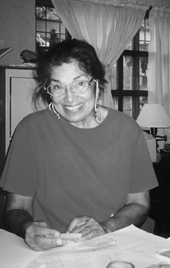 Dear
Friends,
Dear
Friends,
Warmest Greetings to each
of you. Since I last wrote, the government has moved against corruption
by former President Arnoldo Alemán, the same man who closed the
clinic and tried to exile me in 2000. There is proof that over $100,000,000
was stolen from the Nicaraguan people by Alemán and his associates.
The campaign against corruption
has taken attention away from the desperate conditions in which the majority
of Nicaraguans live. Hurricanes and other tropical storms have completely
destroyed the road from Managua to Mulukukú, and thus the means
to transfer desperately ill patients. The government is doing nothing to
fix the road. The local Ministry of Health post has no supplies. The Women’s
Center Clinic continues to provide the only health services for more than
30,000 people. The government has acquiesced to World Bank and IMF demands
by further privatizing social services, making health care inaccessible
for most Nicaraguans.
Silently the poor suffer
and die. The cries of the malnourished infant whose cold develops into
pneumonia become weaker until there is no strength to cry.
Last week Esperanza came
to the clinic from the community of El Corozo, reached by two hours on
a bus and then eight hours of walking. Esperanza, 53, is a mother and grandmother,
and a widow of the Contra War. She is a thin woman who holds her head erect,
has clear, intelligent eyes and a quiet dignity. Esperanza has been bleeding
vaginally for several months from a massive uterine tumor, probably inoperable
cancer. Esperanza has never had a Pap examination, which we offer regularly
to our patients. Early detection of problems and adequate, inexpensive
care could have prevented this unnecessary loss of a life.
While need for our services
grows, the problems in the United States and world economies have severely
reduced donations to our programs. A month ago, I received the shocking
news from our group in Santa Cruz that the clinic had funds for only two
months of operations. Actions we immediately took were to put most of the
staff on half-time (the rest of us working extra hard), let our bookkeeper
go (Vilma Ayon, our administrator, will pick up the work), closed the kitchen/dining
room, reduced aid for patients who travel for further care, and stopped
building improvements, among other reductions.
You, our friends, are progressive
and caring people. You support many good causes. I am shamelessly asking
you to take a moment to look into your hearts at your deepest commitments,
your love, ethics and faith. In the light of your most cherished ideals,
please ask yourselves what you might do to help with our serious financial
crisis.
Simone Weil said the most
sacred belief that dwells in every human being is that good and not evil
will prevail in their life. It is this hope that our work tries to nourish.
My co-worker, Grethel, said just this morning: “Every day there is so much
to do, so much pain, so many people to help. Sometimes, I don’t know where
to begin. Now we worry if there will be money for next year’s programs.”
We live one day at a time and do the best we can each day. Grethel continued,
“We will accompany the people even if we have only ears with which to listen.”
We trust that, together,
we can find a way to help this clinic continue to thrive. All strength
to each of you in your efforts to make this a better, kinder world where
no child will be hungry, where we may exist in peace and joy.
Abrazos,
Dorothy

Eighth Annual End-of-Year Appeal,
2002
Dear Friends,
This annual letter reaches
an exceptionally dedicated group of people. Out of this small mailing
to about 2,500 people, we have been raising close to $50,000, about a third
of the budget for the Mulukukú Women’s Center Clinic. Women
in Mulukukú have expressed surprise that so many people, so far
away, believe in them and their dreams. They are inspired by our support,
as we are by the scope of their work.
The beginnings: In 1988,
a group of poor and minimally educated women, “conscientized” by Sandinista
ideas, formed a co-op to cope with the ravages of Hurricane Joan. They
have organized project after project, animated by a vision of an egalitarian,
non-sexist society. These inventive women have become famous in Nicaragua
for their courageous politics and practical inventiveness in a remote,
bitterly poor, and violence-prone region.
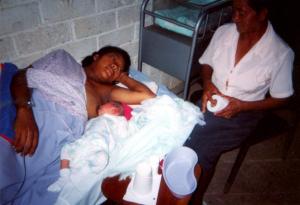 |
| With help from many supporters,
the clinic has developed a birthing room and a midwife program. Again
with much US support, a mobile clinic (sometimes that means a horse when
roads become impassable!) now serves outlying areas more efficiently, saving
ill patients long walks or bus rides. The clinic is in real need of a four-wheel
drive vehicle – can you help us find one? |
In 1990, the co-op took a
risk and hired Dorothy Granada to administer their health clinic. Grethel
Sequiera, of the co-op, admits, “We never thought a gringa could
last a year in this sweltering heat!” But Dorothy and the co-op were a
match made in heaven, politically, spiritually, and medically, wanting
to do the best “on-a-shoestring” medicine possible, especially serving
the needs of poor women and children. Dorothy, a Chicana-Filipina nurse,
had a long history of nonviolence activism in the US and legions of friends
who became supporters of the clinic. Dorothy is famously frugal, and the
clinic has made the most of its funds, with public health programs, trainings
for “health promoters,” advancing the medical skills of local women, screenings
for cervical cancer (high rates in the area), teen education, receiving
delegations of doctors and others who volunteer their services. While waiting
in long lines to be seen, patients take classes in gardening for better
nutrition and herbal remedies, family planning, perinatal care, preventing
domestic abuse... Until this year's drop-off in funds, patients were fed
by the clinic kitchen, and the clinic ran a program for the most severely
malnourished children.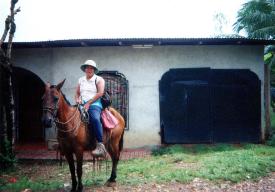
The Mulukukú women
have long been beloved in the Nicaraguan women’s movement for their creative
audacity. A common sentiment is “Those crazy women in Mulukukú don’t
know it can’t be done, so they do it!” But courage doesn’t pay for medicine,
and under current circumstances, our help is needed.
Please remember this is
YOU, over the years, trusting Dorothy, caring about the life-saving work
of the clinic, YOU, joining a movement of women and poor people, YOU, supporting
this headstrong group of Nicaraguan women in a faraway place. In a very
personal way, we are part of this circle of love, pain, sleepless nights,
and inventiveness, shaping the impossible into the possible.
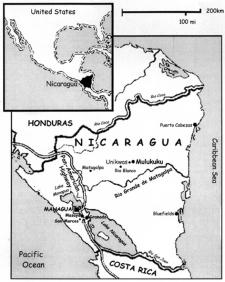
Now we have to face the really
bad news that the decline in the US economy has led to a sharp decline
in income. Responses to earlier appeals this year were far below former
years. We have funds for only about two months forward for the clinic with
no clear relief in sight.
Out of necessity, Dorothy
has cut the staff to half-time and cancelled programs such as the one that
fed waiting patients and malnourished children. Of course everyone at the
clinic is extremely distressed. Valuable screenings and referrals
cannot be continued. The staff salaries often feed large extended families,
and the cuts will make it hard even for staff to get enough food.
Now we need your resourcefulness
in dollars and ideas to be certain that this political hope and medical
progress is not lost, for the women in Mulukukú and all over Nicaragua.
Our community of clinic
supporters has a rare quality of personal connectedness – often through
knowing Dorothy. We choose to belong to each other, to say “your work is
my work. I will help you succeed in building a better world.”
Theologian Reinhold Niebuhr
said that the nearest approximation of love, on the level of society, is
justice, and that the nearest approximation of justice is an equality of
power. The money we have sent has not made anyone rich, but it has allowed
the clinic to be present in the lives of thousands, bringing health, and
changing the balance of power in a muddy, remote town, and in the whole
nation of Nicaragua. Thank you for being with us. “We are all from Mulukukú!”
Janie, Jill
& Kaki, Women’s
Empowerment
Network
Will you help us to be as inventive as the women we support?
Can you suggest places we can look for additional funds? A
church group? A book club? A friend you can ask for a major
donation? One church group in Texas decided to send $700 per month
an a regular basis for a professional's salary. Can you suggest names
to add to our mailing list? Will you think of how you might be able
to send a larger donation yourself? We appreciate our thoughtfulness
as well as your donations.
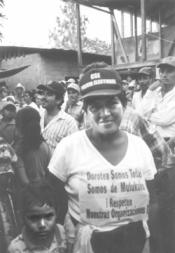 In
light of your most cherished ideals, please ask yourselves what you might
do to help with our serious financial crisis.
In
light of your most cherished ideals, please ask yourselves what you might
do to help with our serious financial crisis.
THIS YEAR, donations are down dramatically. Now our strength is
being challenged by a new crisis, and we need you – urgently. Please
make your tax deductible donations
(Tax ID 77-0566997), payable to:
Women’s Empowerment Network
309 Cedar Street, #547
Santa Cruz, CA 95060
OR you may now help us through the convenience of your credit or debit
card through our new, secure PayPal system. Just click on the button
below:
A Retrospective On the Crisis
In December, 2000, then President
Alemán, on a political impulse, ordered a surprise shutdown of the
popular clinic in Mulukukú. At four a.m. (on Dorothy's 70th birthday),
he had soldiers surround her home to arrest and deport her. She wasn't
home! Warned by supporters, she went into hiding to escape the illegal
order. The clinic was padlocked by the government, and clinic workers took
to the mountains to serve remote communities while they couldn't work in
Mulukukú.
Throughout the crisis, Dorothy
was interviewed frequently from hiding, ever positive, helping to frame
and to invigorate a national debate on the health rights of poor people.
Thousands protested in Managua,
the capital, in Dorothy's favor, the largest demonstration in years. Newspapers
ran sympathetic headlines daily. The international community, including
Amnesty International, the Nicaragua Network, and 32 US Congress members,
made Dorothy’s rights a priority. And the Supreme Court of Nicaragua
finally exonerated her, allowing her a triumphant return from hiding, with
huge celebrations in Managua and Mulukukú.
The unexpected turn of events
boosted the morale of the women’s movement and the health rights movement
all over the country. The ice of fear was broken, and others dared
to protest in big numbers for related causes. Incoming President
Bolaños, though from Alemán’s party, took a decided turn
away from Alemán’s policies, publicly supporting the clinic
and Dorothy, and – let us hope – being open to better national health policies.
Looking back, everyone at
the clinic was ready – logistically, spiritually, politically – for this
surprise visit to the stage of history. Their readiness is also a
testament to the nature of cooperative leadership, where Dorothy (the outside
US professional) and the local women developed shared skills and leadership,
and the Nicaraguan women didn’t miss a beat in assuming leadership in the
crisis. It’s a sign Dorothy can spend less time in day-to-day operations
of the clinic, and more time in educational, political, and fundraising
visits to the US, where we also need her perspective of hope and organizing
in these challenging times.


